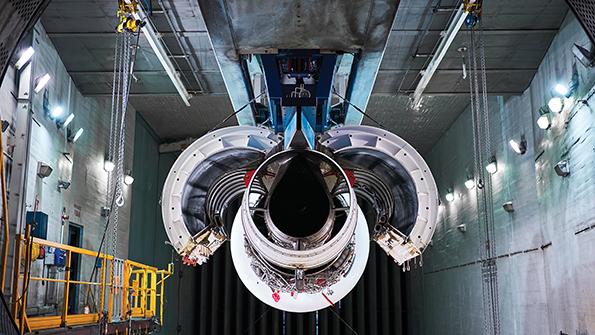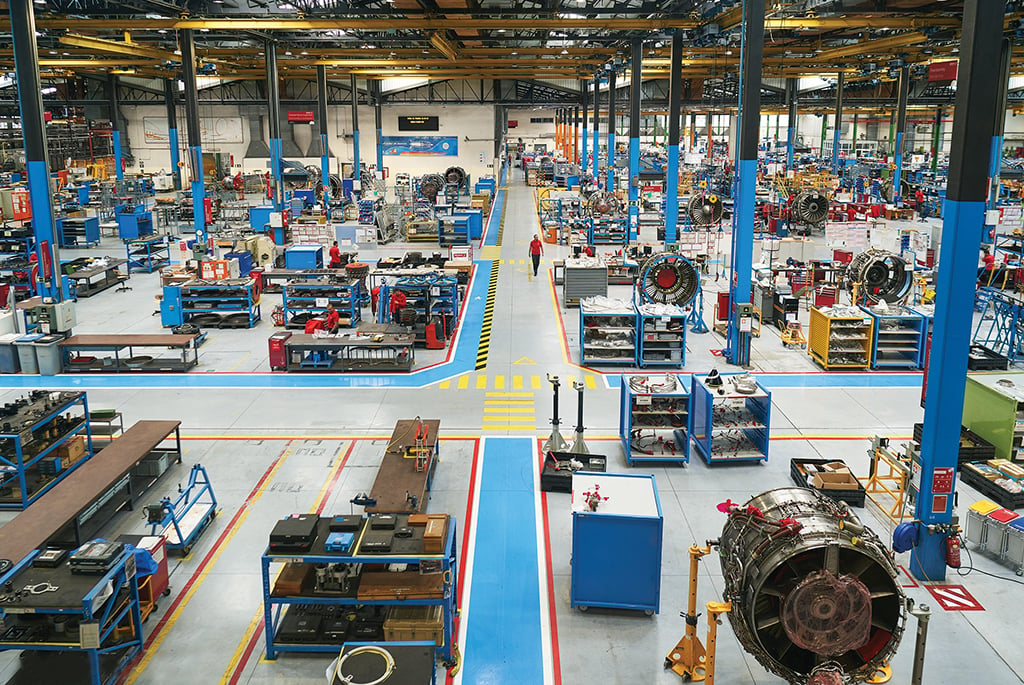
Iberia’s on-site test cell will be correlated for the GTF in April 2023.
Three years after the outbreak of COVID-19, the pandemic’s effects on the commercial aftermarket are lingering. Airlines have sought to streamline maintenance costs, most notably expensive engine MRO commitments, to cope with the crisis. That has resulted in a sharp downturn in scheduled maintenance demand, and while the aftermarket’s prospects are improving, the recovery has been sluggish, with activity still well below pre-pandemic levels.
Engine MRO has been among the most heavily affected segments as expensive and labor-intensive engine overhauls and restorations were placed on hold. Spanish MRO provider Iberia Maintenance decided early in the pandemic to double down on engine maintenance offerings by adding more capabilities and investing in its Madrid engine shop. A quarter of the airline-affiliated MRO’s work stems from the carriers of its International Airlines Group (IAG) parent company—Iberia, British Airways, Aer Lingus and low-cost carrier Vueling—with the remainder coming from non-IAG airlines and leasing customers.
During the early part of the pandemic, Iberia was able to retain all its staff and continued work at its facility located close to Adolfo Suarez MadridBarajas Airport, but activity was reduced vastly compared with the pre-COVID-19 period. “We really reinvented ourselves in everything—not only in production, but in our proposals and how we offer services to customers,” Eylo Gonzalez Merino, engine shop director at Iberia Maintenance, told Inside MRO at the Madrid engine shop in early December 2022.
Reflecting on the previous 12 months, Merino says momentum picked up as the year progressed. “The beginning of 2022 was tough because we were still seeing part of the decrease in inductions, but throughout the year we saw customer confidence increase in the market, and this was reflected in a growing number of engine shop visits,” she said.
Merino estimates that Iberia Maintenance is inducting three times the number of engines as it was before the pandemic, with demand in the International Aero Engines V2500 aftermarket particularly strong. She expects these inductions to rise in 2023. “Now, at the end of the year, we have a much bigger engine pipeline ahead of us, and we will have to decide which inductions we are going to do, taking into consideration the capacity and the pipeline,” she noted.
While the upturn in engine workscopes is positive for MRO providers like Iberia, Merino expects that change could be permanent in overall workscope volumes themselves, given the post-COVID-19 alterations in operator maintenance strategies. “I don’t think the workscopes will ever recover to pre-pandemic levels because operators have found a new way of saving money and a new way of operating the engines without spending those large amounts of money,” she said.
The airfreight segment spike has buoyed the aftermarket in the past few years for the Rolls-Royce RB211 engine, which powers several widebody Boeing aircraft types mostly flown by cargo operators. While Iberia is aware of this demand and plans to keep some staffing and capacity for RB211 operators, it will do so in smaller volumes. Merino anticipates that the number of labor-intensive RB211s in its shop will decrease, requiring a shift in staffing to the V2500 while still keeping enough technicians available for the first wave of Pratt & Whitney PW1000G (GTF) engines.
Iberia Maintenance joined the aftermarket network for the GTF in October after receiving its license from Pratt & Whitney. Technical staff are receiving familiarization training for the GTF; that will lead to a full 16-week training program. The first inductions, of IAG-operated aircraft engines, are expected this year, and Iberia’s on-site test cell will be correlated for the GTF in April 2023.
Multimillion-euro investments also were made in tooling and machinery at the site for both the GTF and Leap engines. Some of these investments include a high-speed grinder and other machinery, which cost around €7 million ($7.5 million), and building of all-new cleaning areas. Iberia Maintenance plans to ramp up Leap services once GTF capabilities are operational, performing smaller checks initially before moving into full overhauls for both engine families.
Despite the company’s focus on new-generation engines, demand related to the narrowbody stalwarts is projected to continue throughout the decade. High workscopes are anticipated for CFM56 and V2500 engines, with inductions yet to peak for either family. However, given the uncertain and inflationary economic environment in Europe, Iberia Maintenance is exploring ways of reducing costs for these programs. Strategies include growing its stock of used serviceable material for both engine types. The primary focus is on investing in new part-repair capabilities for the narrowbody engines to target costs and turnaround times.

Credit: Iberia Maintenance
Merino said Iberia Maintenance likely will hire more staff gradually to service the ramp-up of engines. The company, which currently employs around 600 people in its engine division, plans to acquire skilled technicians through its collaborations with schools and partnerships in Madrid and to utilize its apprenticeship programs. Training takes about two years and involves some theoretical but mostly practical instruction, with trainee technicians learning to disassemble and reassemble a Rolls Trent 500 engine.
MRO demand patterns have shifted in the last year or so, but so has the way in which operators manage maintenance needs. David Alejandro Fernandez de Pedro, Iberia Maintenance’s engine services transformation and support manager, sees a trend of airlines seeking more maintenance flexibility from MRO specialists than ever before for engine repair arrangements. The general preference is for fixed-cost arrangements over time-and-material ones, he says, partly because fixed-cost deals allow for better cost control. “Each engine operator will have a different strategy of when they will want to deliver it or how much they want to use it, and when factoring in particular workscopes, the operator wants to have budgeting costs under control,” he said.
The economics driving maintenance costs are proving challenging across Europe, in part due to inflationary pressures. While inflation in Spain fell to 5.50% in December from the double digits of the previous summer, Merino pointed out the overall price escalation in the commercial aftermarket and cited price hikes by OEM vendors.
“Everything is increasing in price” she said, adding that while Spain remains less affected than other European countries in terms of energy supply, it remains vigilant about any further price escalations in 2023. “We are moving from one difficult situation with COVID to a second difficult situation with inflation escalations, gas and electricity increases,” Merino added.
Initiatives such as installing solar panels on the roof of its Madrid engine shop have been rolled out to achieve more energy self-sufficiency. This approach extends to repairing engine parts, as Merino said the company strives to repair as many as it can rather than bringing in new components.
Other efficiency efforts include further digitalization, with a scheduled move across enterprise resource systems from a SAP system to a Ramco one. This will lead to a 100% paperless operation, with technicians equipped with tablets for accessing digital records. “We are trying to digitalize how we work with customers because this ultimately saves time and any potential misinformation or miscommunication,” Fernandez said.
One challenge over which Iberia Maintenance has less control is disruption of the global MRO supply chain, which has dogged the aftermarket recently and is expected to continue to do so in 2023. Merino pinpoints several causes of these disruptions, including the supply of new material, which has suffered partly due to a shortage of raw materials and a lack of capacity from manufacturers. “We are seeing the same with the repair vendors,” Merino noted.
“The pandemic [has] had a very high impact on every company, and many of them have had to decrease their capacities to adapt,” she said. “Increasing these capacities back is difficult for them.”
Merino cited factors such as large numbers of people leaving the aerospace industry over the past three years, the length of time needed to train staff on technical repairs and even the way companies planned for the recovery, so repairs are taking longer than expected.
While the aftermarket supply chain is proving frustrating for Iberia Maintenance, Merino said the MRO provider it had planned for the eventual recovery, and so far it is fulfilling all its planned turnaround times. “That’s why we are aiming to internalize all the repairs that we can,” she said.





